In this article:
Several items in the kitchen contain beneficial compounds and often exhibit medicinal properties. Curry leaves and the juice of onions are two such highly beneficial items.
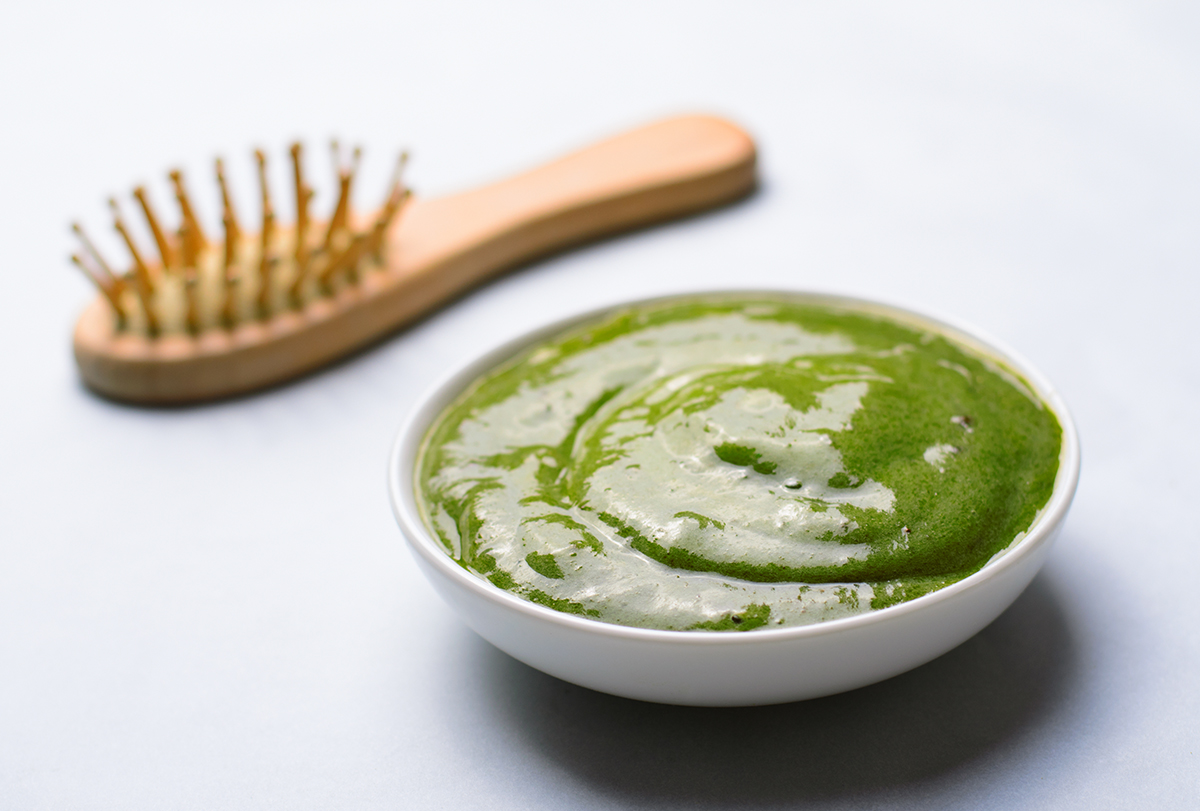
These ingredients are commonly used for skin or hair problems traditionally and anecdotally. However, the studies conducted on the use of both curry leaves and onion juice for improving skin and hair health are limited.
Therefore, no conclusions can be drawn on the efficacy of these ingredients, especially in the absence of clinical studies. This article explores the suggested uses of curry leaves and onion juice and discusses the limited studies conducted on them.
Curry Leaves or Extracts
Curry leaves are taken from the Murraya koenigii plant and are a widely used herb. The leaves of this plant are commonly used as a spice in Indian cuisine. Aside from its culinary uses, curry leaves have also been used in Ayurvedic medicine.
It has been shown that curry leaves and other parts of the plant are rich in carbazole alkaloids, which act as anti-inflammatory, antidiabetic, antitumor, and neuroprotective agents.
In addition, curry leaves are an excellent source of beta carotenes, (1) iron, and folic acid. Due to this beneficial composition, curry leaves found a place in various anecdotal remedies, especially for hair care.
Suggested benefits of curry leaves for hair
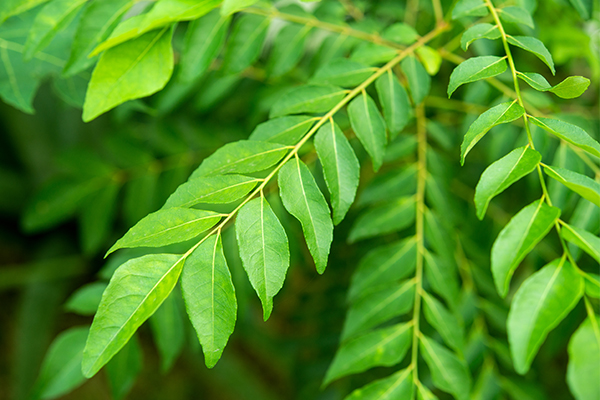
Although there are no clinical trials to confirm the effects of curry leaves and their extracts, they have been popularly used to benefit hair in the following ways:
- May prevent graying of hair: Curry leaves are rich in vitamin B and antioxidants, which can boost melanin production and combat graying of hair caused by aging, oxidative premature greying, medical conditions, and nutritional deficiencies.
- Improve hair health: The nutrient-rich composition of curry leaves, including antioxidants and amino acids, helps strengthen the hair follicles and moisturize the hair. This, in turn, can make your hair strong, smooth, and shiny and can treat split ends at the same time.
- Boost hair growth: The protein and beta-carotene in curry leaves help manage hair loss and boost hair growth. Curry leaves are often used with argan oil or coconut oil as a hair tonic.
- Cleanse the scalp: The use of curry leaves can help remove dead hair follicles and clean the scalp, which can otherwise impede hair growth.
- Reduce scalp inflammation: The antioxidants in curry leaves can help treat inflammatory scalp problems such as psoriasis, dandruff, and dermatitis.
- May improve hair texture: Curry leaves can help make your hair non-frizzy, smooth, silky, and shiny.
What does science say?
Curry leaves have a beneficial phytocompound composition that includes keonine, koenimbine, mukoeic acid, and murrayazoline, which exhibit medicinal properties. (2) Therefore, curry leaves are potentially beneficial for your hair.
The following studies have explored the uses of curry leaves for hair health and texture improvement:
- A study conducted in 2018 tested the use of a polyherbal hair oil with curry leaves as one of the ingredients for treating hair problems such as alopecia, hair fall, baldness, dryness, gray hair, and dandruff. Results showed that the oil could potentially help improve the hair problems and was safe to use. (3) However, the study had its limitations and the results are not supported by any clinical trials.
- One study explored the medicinal properties of curry leaves and found that the volatile bioactive oils in curry leaves can help prevent premature graying of hair. (4)
- A study conducted in 2008 demonstrated that curry leaves are rich in antioxidant polyphenols that can help neutralize the action of damaging free radicals. (5) This, in turn, can help prevent premature graying of hair and hair damage.
- The antioxidant properties of curry leaves were supported by another 2014 study that concluded the presence of flavonoids and polyphenols in curry leaves. The study also showed that curry leaves can provide chemoprotection. (6)
- Multiple studies demonstrated that curry leaves act as antimicrobial agents against fungi (7) and bacteria, (8) owing to their carbazole alkaloid content.
- Curry leaves have been shown to act as anti-inflammatory agents as well. (9)(10)
- Curry leaves can be used as a hair tonic to help boost hair growth. (11) An animal-based study conducted in 2015 showed that the mahanimbicine in curry leaf oil can help increase the number of hair follicles on the scalp. (12)
- A 2016 review paper proposed the use of curry leaves to manage hair fall. (13) However, the mechanism behind this is not explained, therefore warranting further research.
Ways to use curry leaves for hair care
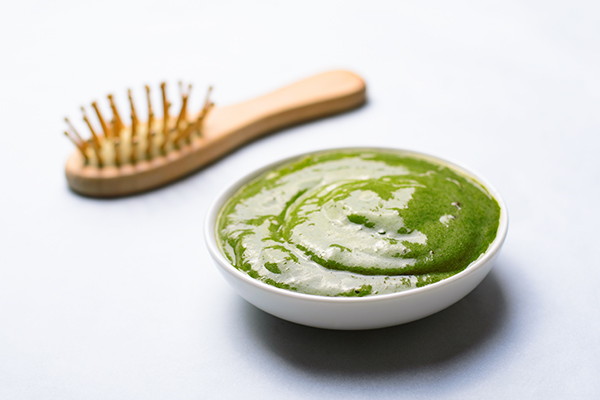
Curry leaves can be used to make hair rinses, hair oils, and hair masks to benefit the hair.
Caution: While curry leaves are generally safe for use, it is always best to conduct a patch test before using homemade hair masks or rinses to check for allergies or sensitivity reactions.
- Warm about 4 tbsp of coconut, almond, jojoba, or olive oil, add 10–15 whole or ground curry leaves into it, and mix them well. Allow the mixture to cool for 10–15 minutes. Use this lukewarm oil to massage your scalp and hair. Shampoo as usual after half an hour. (14)
- Grind onions, garlic, and curry leaves to a fine paste. Heat the paste with some coconut oil and continue cooking until it turns dark. Once cooled down to room temperature, strain the mixture and use it as a hair oil.
- Grind curry leaves with water to form a paste. Apply the paste to damp hair and wash your hair after 20 minutes.
- Add curry leaves and hibiscus petals to boiling water. Once the water reduces to half its initial quantity, turn off the heat. Allow the mixture to cool and use it as a hair rinse.
- Form a fine paste by grinding about 15 curry leaves with water. Mix the paste with ½ cup of yogurt and apply it to your hair and scalp. Rinse your hair after half an hour.
Onion Juice or Extracts
Onion juice and its extracts such as onion oil are rich in nutrients. Containing various nutritional compounds including vitamin B9, B6, and C and potassium, onion juice can be highly beneficial for your hair.
It is suggested that onion juice acts as an anti-inflammatory, antioxidant, antibacterial, and antifungal agent, which can help improve hair health and keep scalp problems at bay. This is why onion juice has been used as a home remedy for hair care for a long time.
Suggested benefits of onion juice for hair
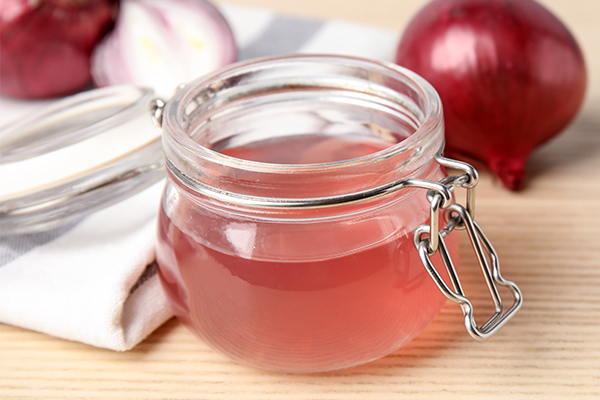
While there are not many studies to support the use of using onion juice on hair, anecdotal evidence suggests the following benefits of onion juice and extracts:
- May improve hair growth: The vitamins and minerals in onion juice can provide nourishment to the hair follicles, therefore helping stimulate hair growth. In addition, the use of onion juice may boost blood circulation to the hair follicles, aiding follicular function for hair growth.
- May strengthen the hair: Onion juice contains high amounts of sulfur, which is a key element in keratin proteins that make up hair. Therefore, it is believed that the sulfur in onions can help strengthen your hair and prevent thinning or breakage.
- May treat hair loss: The use of onion juice is often suggested for the treatment of alopecia areata, wherein the body’s immune system attacks the hair follicles and causes hair loss.
- Can help control scalp infections: The antibacterial and antifungal properties exhibited by the sulfur in onion juice can help combat infectious problems such as dandruff and acne.
- May prevent premature graying: The antioxidative nature of onion juice helps neutralize the effect of oxidative free radicals, therefore helping prevent graying of hair.
- Can help improve hair appearance: Applying onion juice to your hair can help make it shiny, bouncy, voluminous, and smooth.
- Aid lice treatment: Since sulfur has a pungent smell, the use of onion juice or onion oil can help prevent lice infection and even aid in its treatment.
What does science say?
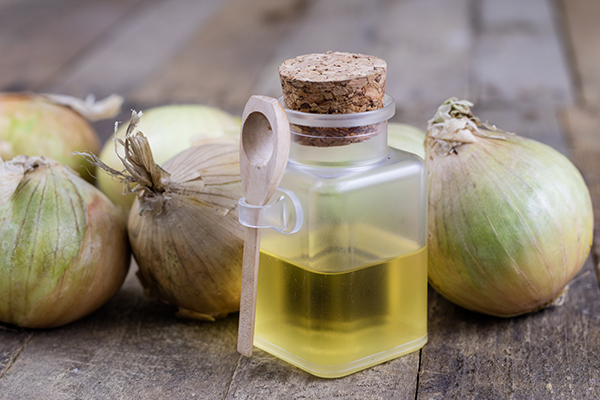
Out of the various suggested benefits of onion juice listed above, only a few are backed by scientific studies. The following studies demonstrated the effects of onion juice on your hair:
- One study revealed that onion juice is rich in catalase enzyme, which breaks down hydrogen peroxide, therefore helping reduce oxidative stress on the hair and preventing graying of the hair. (15)
- The use of crude onion extracts has been shown to boost hair growth in people with alopecia areata, owing to their sulfur and phenolic content. This effect was more pronounced in men when the topical solution was applied twice daily for 2 months. Therefore, onion juice can potentially be used as topical therapy for the treatment of hair loss. (16)(17)
- Several studies suggested that onion juice can help combat fungal infections caused by Candida, Malassezia, (18) and dermatophytes. (19) In addition, onion juice acts as an antibacterial agent due to the presence of the bioactive compound quercetin. (20)
Ways to use onion juice for hair care
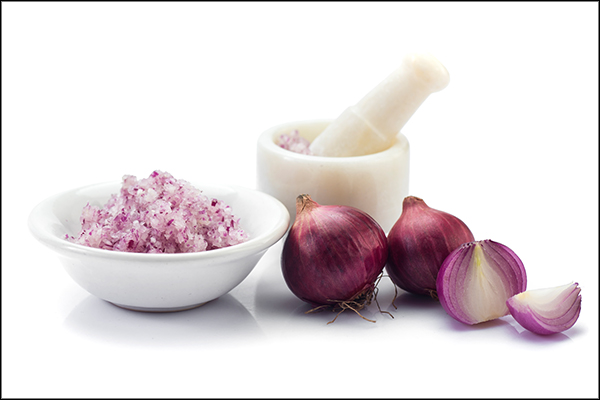
The juice extracted from onions is commonly used either as a hair rinse or as a base for hair masks. You can also find onion juice in marketed products such as gels, shampoos, serums, and soaps.
Caution: Always conduct a patch test before using any of the following remedies to check for sensitivity or allergies. Dilute the juice with water or oil if it causes slight itching or erythema. Make sure to consult your doctor if you have excessive hair loss, which may be due to an underlying medical condition.
- Grind a few peels and chopped onions to a fine paste. Mix in water and filter the mixture through a muslin cloth. Use the extracted onion juice as a hair rinse.
- Extract onion juice using the method mentioned above. Then, combine the onion juice and coconut oil into a saucepan. Boil the mixture for a few minutes and allow it to cool. Strain the mixture using a muslin cloth, and use it to oil your hair 30–40 minutes before shampooing.
- Extract fresh onion juice and mix in 2 tbsp of yogurt. Apply the mixture to your scalp and hair and leave it on for 30 minutes before rinsing. This hair mask cleanses and exfoliates the scalp and also helps control oil production.
General Queries
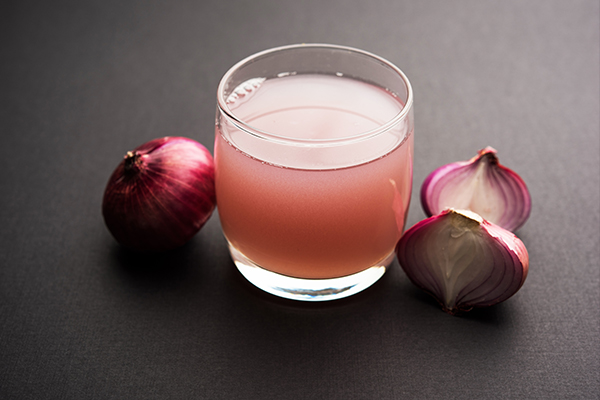
Can onion juice or oil be used as an overnight remedy?
It is not advisable to leave onion juice or oil on your scalp for long periods as it can cause stinging and irritation, especially in its crude form.
What can I do to mask the smell of onion from the hair?
It is generally enough to thoroughly shampoo and condition your hair in order to get rid of the pungent onion odor from your hair. You can also add peppermint, frankincense, or lemon essential oil to your conditioner to mask the residual smell.
For how long can I store onion juice in the fridge?
While it is best to use fresh onion juice on your hair, you can store it in the fridge for up to 5 days.
Final Word
You can find various home remedies using onion juice, onion extracts, and curry leaves for hair health on the Internet. These remedies are often used to make hair shiny, smooth, and thick. However, most of the uses and remedies of these ingredients are not backed by scientific evidence.
The limited studies available on the effect of curry leaves and onion juice on your hair explore the potential of their bioactive composition in treating different scalp and hair problems such as hair loss, dandruff, and premature graying. To establish these effects, however, further clinical trials are warranted.
You can use curry leaves or onion juice hair rinses, masks, and oils weekly as a part of your hair care regimen if you are not allergic to them. It is best to consult your doctor if you notice excessive hair fall or signs of infection instead of using home remedies. If you have already been diagnosed with an underlying condition, ask your doctor if these remedies may aid treatment.
- Was this article helpful?
- YES, THANKS!NOT REALLY


